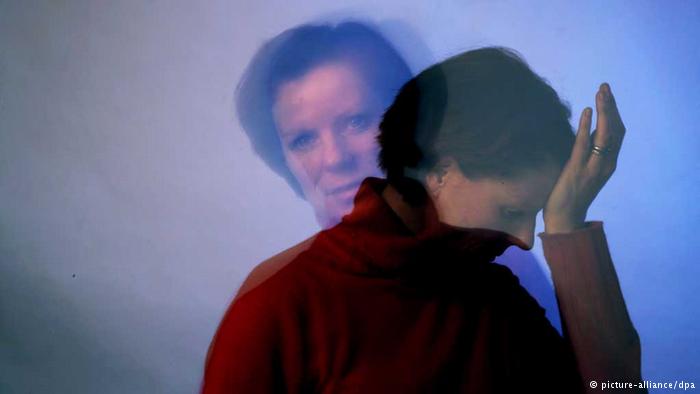In a state of anxiety, the body produces more adrenaline. Individuals are more alert, and are able to react more quickly. Anxiety and fear can protect us. However, when fears arise independently of the situation we are in, and when they multiply, then it can become pathological - leading to regular anxiety disorder or phobias. Panic attacks accompanied by a rapid heartbeat are typical, along with a sense of dizziness and a feeling of suffocation. Spiders and snakes are common triggers of phobias, and upcoming tests can also cause alarm. Panic attacks - which tend to occur without a trigger - are a symptom of anxiety disorder. Women are most commonly affected.
Frequency
Women: 22 percent
Men: 9.7 percent
Bipolar disorder
People with bipolar disorder switch between phases of depression and mania. During depressive phases they are defeated and down. In manic phases they are often euphoric and high-spirited. At those times, sufferers are likely to take risks. Bipolar disorder, also known as manic-depressive behavior, is treated with both psychotherapy and medication. Some two million people suffer from this in Germany alone. An early diagnosis and treatment can have a positive effect on the course of the disease.
Women: 3.1 percent
Men: 2.8 percent
Depression
People with depression are often despondent. They lack drive and find it hard to muster interest and enthusiasm. Those are the main symptoms. Depression is about more than just feeling bad. It is perhaps the best-known mental illness, and must be treated by specialists. People with depression often suffer from insomnia, are unable to concentrate, have no appetite and have negative thoughts about the future. This can even lead to suicide. Patients with depression are treated with psychotherapy, and also with medication. Early recognition of the symptoms is important here, too.
Women: 11.4 percent
Men: 5 percent
Occupational burnout
Permanent stress, depression, insomnia, negative thoughts and anxiety - these can all lead to a serious state of exhaustion. There is no strict definition of the symptoms of occupational burnout - it`s more a description of how a problem develops. Patients must be treated with the utmost urgency, to relieve both the physical and mental symptoms. It was initially better-known as "executive burnout," with stress and mental overload being triggers. However, young people are increasingly diagnosed because they feel stressed or overloaded by the demands of school or college, for instance. Therapy can take weeks and, in some cases, years.
Women: 5.2 percent
Men: 3.3 percent
Borderline syndrome
Symptoms of borderline syndrome can include great fear of being alone, depression, and a distorted perception of one`s own body. People who suffer from the disorder commonly hurt themselves, for example by slashing their skin - particularly on the forearms - with a razor. Doctors regard abuse or emotional neglect as common causes. The self-identity of sufferers is frequently disturbed and they often abuse a range of drugs.
Women: Unknown
Men: Unknown
Obsessive compulsive disorder
Have I left the stove switched off at home? Did I leave the apartment door open? These are examples of compulsive thoughts that are, in themselves, harmless. People with obsessive compulsive disorder (OCD) are plagued with recurring thoughts and images. Those affected feel a level of compulsion, which they are not able to escape from, to perform rituals. Some may feel compelled, for instance, to count the number of stairs on a stairwell. Dirt can be a trigger. Many are aware that their compulsions are an absurdity, but cannot escape them. This mental illness also has an influence on social contacts, which often break down completely.
Women: 4.2 percent
Men: 3.5 percent
Anorexia nervosa
Addictions are among the most common psychological diseases in Germany, and they include anorexia nervosa. One of the most notable features is significant weight loss, with patients not eating enough and constantly trying to lose more weight. Many of them will take an excessive amount of exercise, feeling that they are too fat and seeing objectionable layers of fat where there are none. They constantly check their weight. Everything revolves around food, or rather, not eating it. People with anorexia don`t believe themselves to be sick. It`s a condition that affects women considerably more than men.
More about:
















































